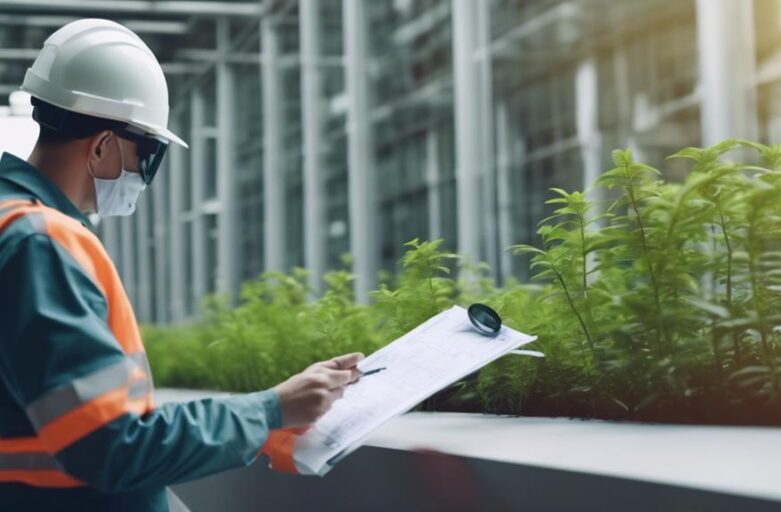To really nail building inspections, it's important to understand why they're needed and hire experts to do them. Set clear boundaries for what the inspection should cover and have all your paperwork ready. Be involved in the inspections, follow the advice given, and keep a log for rules and regulations.
Use construction management tools and make sure everyone involved is working together. Keep a thorough record of your project to help you stay on track. Stick to these steps and you're sure to create a safe and healthy space.
Want to find out more?
Key Takeaways
- Get skilled inspectors who have been trained and have worked in this field to guarantee detailed checks.
- Set the inspection area based on the building's size, how complicated it is, and how old it is for a focused review.
- Keep your paperwork tidy, including reports from inspections, permits, and certificates, to show that you're following the rules.
- Join in inspections, ask questions, and listen to the inspector's tips for making the building safer.
- Work well with everyone involved and keep thorough records for successful inspections and finding solutions.
Understanding Building Inspections
When you learn about building inspections, you'll see how important they are. They help make sure buildings are built right, safe, and follow the rules. The inspector is like a detective, carefully checking everything in a building to make sure it's safe.
Building inspections are more than just looking at a building. They check many parts, like the electrical system, pipes, heating and cooling, and how strong the building is. They don't miss anything, all to make sure the building is of good quality and safe.
There are different types of building inspections. Before the building starts, an inspection makes sure everything is planned according to the rules. While the building is being built, inspections make sure everything is going as planned. When the building is finished, a final inspection checks if it's ready for people to move in.
Keeping records of these inspections is also important. The reports and certificates from inspections are like a report card for the building, showing it followed all the rules. These are very useful if there are any disagreements or legal problems later.
Importance of Qualified Inspectors
The job of qualified inspectors during a building check-up is super important. They're not just people with fancy titles! They use their schooling, certificates, and work history to find safety risks, make sure buildings follow the rules, and keep buildings safe.
Let's chat about how to pick the right inspector and how their training and past jobs help them out.
Selecting a Qualified Inspector
When it comes to keeping a building safe and up to code, picking a good inspector is key. This person has the right schooling, practice, and know-how to make sure a building follows all the rules.
An inspector is like a safety buddy for your building. They're not just there to do a job, but they're dedicated to keeping everybody in the building healthy and safe. So, don't take risks when it comes to safety. A good inspector helps avoid mistakes during the check-up of the building.
After all, when it comes to inspections and life in general, it's always smarter to play it safe.
Inspectors Certification and Training
Building inspectors have a big job. They don't just become experts out of nowhere, they've to learn a lot. They study hard in special programs to get certified. They take tests, learn about building rules, safety, and how to inspect buildings properly. This is a tough job but it's really important to keep us all safe.
Being an inspector isn't a one-and-done deal. They've to keep learning all the time. This way, they always know the newest rules and ways to do their job best. This isn't just to make them better, but employers want this too. It shows that they really care about their job and want to make every building safe. It's like a badge that proves their hard work and dedication.
Inspectors Professional Experience
Why do we need skilled inspectors? It's all about your safety. Inspectors study construction management to understand how buildings should be made. They make sure all building rules are followed. They know how to find mistakes in the design or building that could make it unsafe. They make sure safe building materials are used everywhere.
Inspectors also check that safety items like smoke detectors are installed correctly. Hiring an inspector means creating a safer place for you and others. So, when it comes to checking buildings, only the best inspectors should be chosen.
Establishing Inspection Scope
So, you want to inspect a building properly, right? Here's a simple way to do it.
Firstly, you need to know what exactly you're looking at. This means figuring out what parts of the building you're checking. This could be anything from the electrical system to the plumbing. It's like drawing an imaginary boundary around what you're going to inspect.
Secondly, think about how much detail you need. Is the building big or small? Is it complicated or simple? Old or new? These factors will help you decide how deep you need to dig into your inspection.
Thirdly, you need to know what you're comparing your findings to. This means setting some standards for what's okay and what's not. These standards could be about how well things are working, or if they meet certain rules or regulations.
Here's a handy table to help you remember:
| Steps | What It Means | Why It's Important |
|---|---|---|
| What to Look At | The parts of the building you're checking | Helps you know where to focus |
| How Much Detail | The size, complexity, and age of the building | Helps you decide how deep to go |
| Set Standards | What you're comparing your findings to | Gives you a way to judge what you find |
And don't worry, we're all in this together! Checking buildings to make sure they're safe and healthy is a team effort.
Importance of Relevant Documents
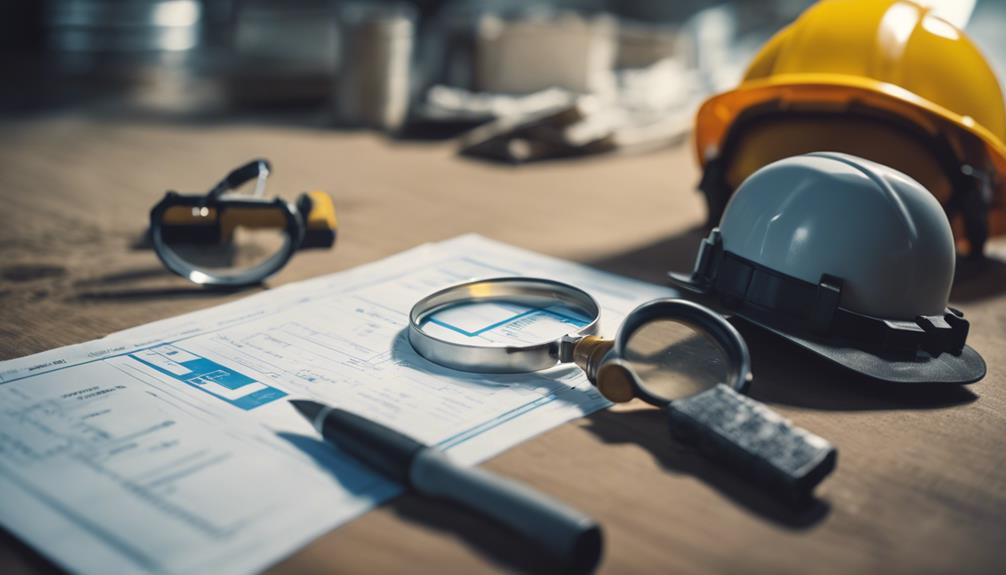
When you're doing a building inspection, it's really important to keep all your papers in order. This includes things like inspection reports, permits, certificates, and even photos. These papers aren't just random stuff, they're really important tools that can help protect you if there's ever a problem or someone questions your work.
These papers show that you're following all the building rules. They're proof that you're making sure everything is safe and healthy in the building. They also help you keep track of what you've checked and what needs to be fixed. Having these papers ready means you're doing your job properly, and it lets you focus on making sure the building is safe.
Keeping all your documents is like planting a seed that will grow into a tree later. It's a way of making sure your inspections in the future will be good too. It's not just about checking things off a list, it's about showing that you're trustworthy and professional. So, always keep your important papers. They're more than just papers, they're your helpers in making sure buildings are safe and healthy.
Active Participation in Inspections
Taking part in building checks is super important. If you join in, you can learn a lot.
Talk to the person checking the building, ask them questions and understand everything about your building's condition.
Being there as it happens helps you solve any problems right then and there.
This way, you'll know exactly what needs to be fixed or maintained.
Pre-Inspection Preparation
Getting involved in building inspections, which means getting all your paperwork and permits ready beforehand, can help speed things up and save you effort. By making sure everything is ready for the inspection, you play a big role in the inspection process.
This not only makes things go smoother, but also makes you feel like you're part of the team. Being there during the inspection lets you deal with any problems right away and show the inspectors around as needed.
Keep in mind, being involved doesn't just make things go faster—it also helps make sure your building is safe and follows the rules, creating a better environment for everyone.
During Inspection Conduct
Taking part in your building inspection is more than just standing there. It's about getting involved, asking smart questions, learning the steps, and writing down important things. Be more than just a watcher; be a big part of the job.
This helps you understand safety rules in detail, and why they're important for keeping your building safe and healthy. Write down everything – every detail, every suggestion, and every problem found. This way, you're not just getting a report, but you're really part of keeping your building safe.
Always remember, being active in inspections and following safety rules is what makes a building safe to use.
Following Inspection Recommendations
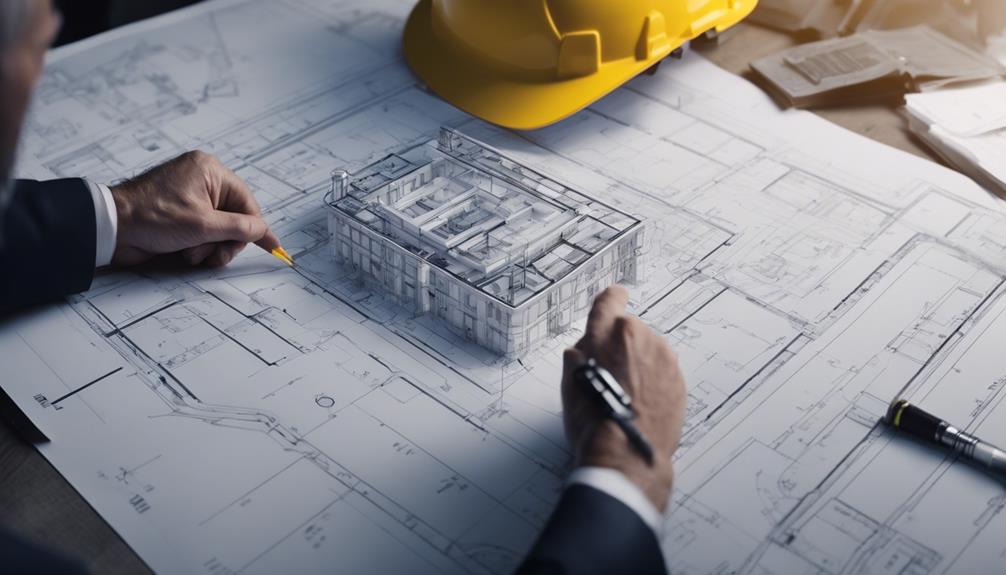
Following the advice of a building inspector is really important. It's like a quick way to deal with possible dangerous issues. It helps make sure the building is safe and healthy for everyone.
Inspections help find any hidden problems. Think of it like a map showing you the way through a maze of possible problems, leading you to a safer building. You need to put these tips into action right away. It's not just something you can choose to do or not do, it's your responsibility. We want everyone to feel safe and belong.
If you ignore these tips, you might have to spend a lot of money fixing things later. Or even worse, you might get into legal trouble. It's like trying to walk on a high wire without a safety net. You wouldn't want to fall into trouble with building codes, right?
Stay on top of these tips and make sure to handle them often. It's about making a safe culture that values health and well-being above all else. It's about following building codes to make sure your building is safe and long-lasting. Following these tips is the way towards a safer, healthier building. It's a place where everyone belongs.
Record Keeping and Compliance
Just like you listen to your building inspector, it's just as crucial to keep track of every inspection and certification to follow building rules and laws. Think of your records like your building's personal journal, always noting down its health and safety adventures.
You may ask, why is this record keeping so important? It's your evidence that you've played by the rules, your safety blanket. It shows that you've been watchful, responsible, and stuck to safety steps. Not keeping such records isn't an option. It's like trying to build a house with no base.
These records aren't just boring paperwork. They're your building's storybook, showing you patterns and places to make better. They make sure you keep following the rules and help you spot and stop possible problems.
Plus, if there are disagreements or court cases, your records are your number one backup. They're real, solid proof of your dedication to keep your building safe and up to code.
In short, careful record keeping and sticking to the rules aren't just about checking off a list. They're about being part of a group that values safety, being open, and being responsible. They're your tickets to a safer, healthier building.
Role of Construction Management
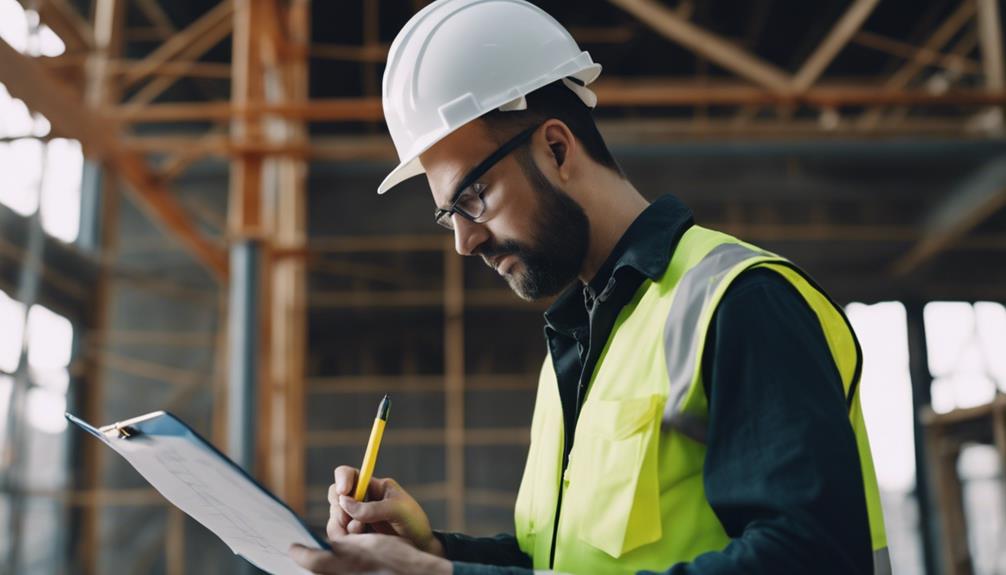
Construction management is like the captain of a ship in the construction world. It helps make sure your construction project finishes on time, doesn't cost more than planned, and meets all quality checks. This role isn't just about putting up buildings; it's about making the place safe, durable, and easy to use for everyone.
The people in construction management are like the protectors of your project. They make sure every part of the building is built correctly and follows all the rules. By doing this, they help make your building safe and long-lasting.
Besides, construction management helps to use resources wisely. This means your project won't cost more than it needs to. They help maintain a balance between cost and quality, so you get the best possible outcome. They're like your friends, helping you to successfully complete your construction project.
Stakeholder Coordination
Every building job involves lots of people. Your role is to make sure that everyone – like inspectors, contractors, and building owners – understand what's happening. You're not just part of a team, but a vital piece of the puzzle that helps make building inspections go smoothly.
Communication is key. Talk with your team, listen to their worries, and help solve any problems found during inspections. Remember, keeping buildings safe and healthy is everyone's job.
Building inspectors rely on your help. What you do matters to the accuracy of information collected and the decisions made. Coordinating with stakeholders isn't just about checking things off a list; it's about working together to win and tackle challenges.
Working together effectively helps solve problems faster, which makes building inspections successful. But it's also about feeling part of a team, knowing that you've helped with something important. So, step up, connect with others, work together, and let's make building inspections better.
Effective Project Documentation
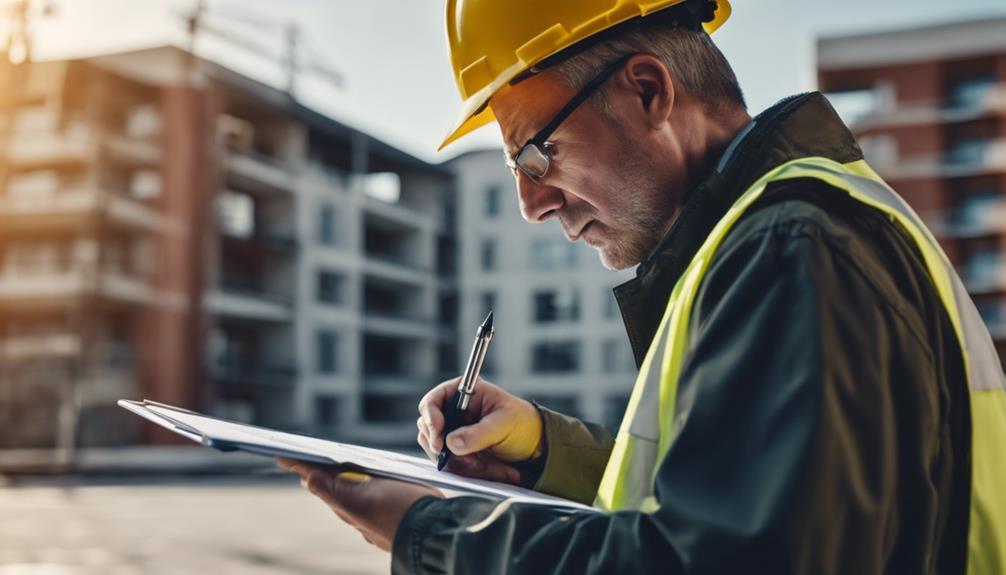
Let's talk about why keeping good records is super important when you're doing a building inspection. Picture it like a map for a really hard maze – the maze is made of all the rules you need to follow. Your records make sure you don't get lost and that you're following all the rules.
Your records are also like a shield. They show that you've checked everything and fixed any problems. They're proof that you're keeping the building safe.
Think of your records as a book about your building. They tell the story of how it's changing and growing. They also help spot any problems and avoid risks.
But that's not all – your records also help everyone work together. They make sure everyone knows what's going on and feels included. So, when you're doing a building inspection, remember that keeping good records isn't just filling out forms – it's your best helper.
Conclusion
Okay, let's break down the top tips for doing safe and healthy checks on buildings.
First, it's super important to pick a skilled inspector and be clear about what needs checking. Don't ignore vital paperwork and make sure to be involved in the process.
Record everything accurately and follow all rules. Get your building team involved, keep everyone informed, and write down all details.
These aren't just random ideas – they're the master plan to make sure your building is safe, good for your health, and meets all standards.
Let's work together to make buildings better!


